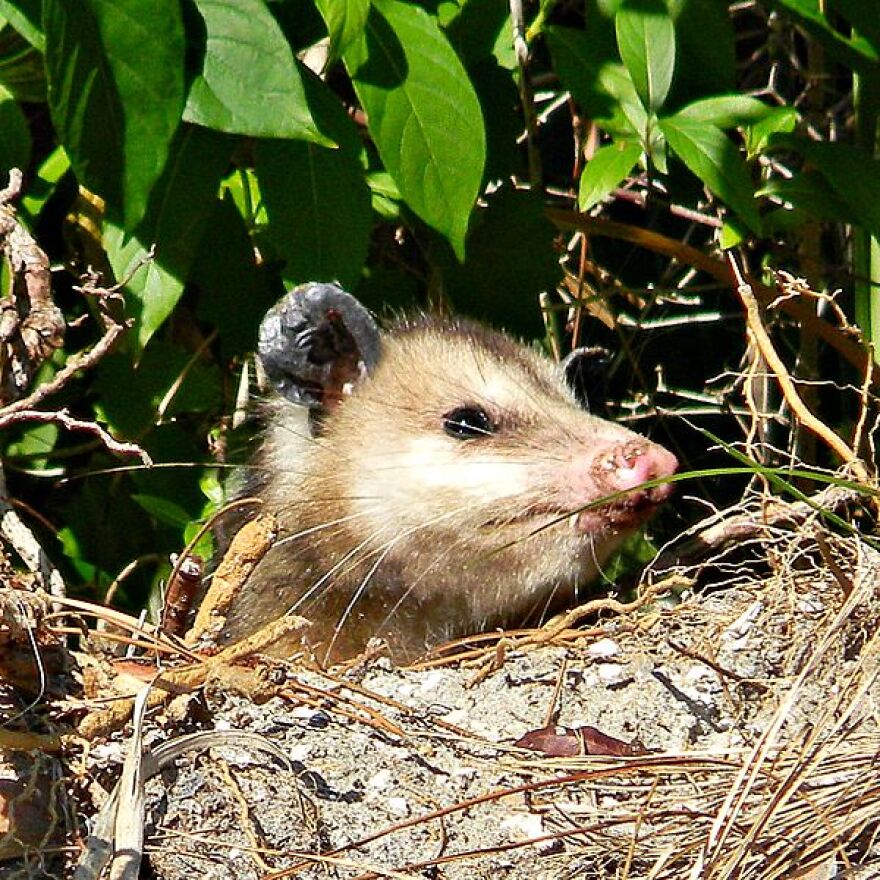Imagine this scene: You're preparing to go for a morning jog in your Fort Lauderdale neighborhood when you spy an opossum sifting through a pile of overripe mangoes beneath a tree in the backyard. Or perhaps on the course of that morning jog, you spot a brown baby bird hopping on the ground beneath a cocoplum. It's pumping its wings but not gaining much altitude.

What's the proper protocol in these situations? Assume the opossum is rabid and call in a trapper (or set out some poison)? Snatch up the fledgling and take it home? These are the kinds of questions the Humane Society of the United States' South Florida Wildlife Center (SFWC) is prepared to answer. They're also examples of the kind of unnecessary interventions that the SFWC hopes to curtail.
In South Florida, where both wildlife and development are abundant, it has become increasingly important to educate the public in how to coexist with native flora and fauna. Sherry Schlueter, executive director for SFWC, is well-versed in the challenges involved in such a task.
"We want to teach people to respect wildlife, not fear it," Schlueter says.
Take the aforementioned opossum for example. The marsupial's toothy maw and naked tail tend to freak folks out, but the critters perform an important role in an urban landscape, such as consuming rotting food that might otherwise attract rats. Schlueter says "if people only understood the value of an opossum" they wouldn't be so quick to rid them from the neighborhood.
On the flip side, there are those cute and cuddly creatures that bring out people's compassionate side. Baby animals in particular often are on the receiving end of well-intentioned but wholly unnecessary "rescues." That hypothetical fledgling bird mentioned above would be one example.
"People's tendency is to be kind and compassionate," Schlueter says. "The instinct -- especially for animal lovers -- is to protect and nurture."
Problems arise when people make assumptions about the "orphan" status of seemingly unattended young animals. This happens frequently with birds and mammals whose parents have temporarily left the young to gather food. A well-meaning would-be rescuer sees the baby, assumes it's abandoned, and inadvertently "kidnaps" it.
It's something Schlueter and her team of 60 employees seek to avoid whenever possible. With smart phones and social media as the norm, it has become easier for SFWC staff to communicate with the public and guide them in how best to help South Florida's wildlife.
In some situations, what's best is simply leaving an animal alone to follow its own course. In other cases, SFWC can help people to identify -- via digital photo or video -- potentially injured creatures. They also can guide people through on-the-spot fixes, such as "renesting and reuniting." By communicating via phone or online, SFWC staff can determine when it's necessary for the non-profit rescue center to intervene.
Each year, the SFWC -- which is open 365 days -- takes in about 13,000 animals at its Fort Lauderdale facilities. Those numbers represent more than 255 species, with everything from blue herons and Cooper's hawks to baby raccoons and soft shelled turtles. This spring saw an unusual influx of gray fox kits, including one little guy that came to the center weighing one-third of a pound. SFWC is in the midst of raising funds to construct a dedicated habitat for the growing fox. (Donate to the cause here.)
Most of the animals that come to the SFWC aren't "getting into trouble because of something in nature" Schlueter says. Instead, they're urban wildlife that have sustained injury or become orphaned because of things like habitat destruction, entanglement with monofilament (discarded fishing line), poisoning, dog or cat attacks, car strikes, gun shots, or other human-related factors. Another common contributing factor to injury and illness is the feeding of wildlife, which Schlueter strongly discourages.
Some animal victims, on the other hand, can be characterized as mysterious freaks of nature. Take this winter's razorbill influx. The arctic seabirds invaded South Florida in droves much to the surprise of birders and ornithologists alike.
Many of the out-of-range birds suffered illness and injury, requiring numerous rescue efforts around the state. The SFWC rescued 18 razorbills during the affair. Sadly, many of the patients were too far gone by the time they were in the hands of the SFWC veterinarians. Three of the birds were successfully rehabbed and reconnected with a flock in Miami-Dade County.
While not as statistically successful as they'd have liked, Schlueter says the razorbill rescues demonstrated how resourceful and creative the SFWC is in executing its mission. Staffers contacted rehabbers in northern regions to better understand the birds' needs. They iced the birds' water and salted their fish, coordinating with experts at the Cornell Lab of Ornithology and National Audubon Society, as well as state and federal authorities on how best to handle the releases.
"There was a slight learning curve, but we were well on top of it," Schlueter says.
The SFWC are accustomed to creative solutions and relying on the support of the community. For instance, they've worked with Florida Power & Light Company, private tree companies, fire departments, and even local climbing clubs to perform challenging rescues that required scaling trees, buildings, or telephone poles.
The organization is also continually working to sustain and grow its relationship with the public. They offer on-site workshops and other educational programs as well as other public outreach. Schlueter says tools like Facebook have helped the SFWC to broaden its audience and -- perhaps somewhat ironically -- reconnect Florida residents with the natural world.
"People have gotten so far away from nature," Schlueter says.
Connect with the SFWC -- and its array of wildlife -- via the South Florida Wildlife Center Facebook page or website. To join the team of 650 trained volunteers, fill out this online form. Finally; for questions about Florida wildlife or to report an injured animal, call 954-524-4302 or 866-SOS-WILD.









